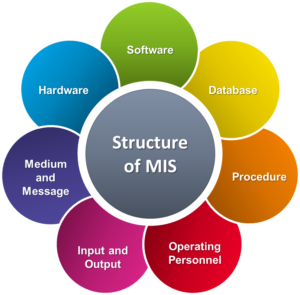 MIS (Management Information System) software refers to a type of software application or system designed to facilitate the collection, processing, storage, retrieval, and dissemination of information for managing an organization’s operations and decision-making processes. MIS software typically provides tools and features to support various managerial functions, including planning, monitoring, analysis, and reporting. Here’s an overview of MIS software:
MIS (Management Information System) software refers to a type of software application or system designed to facilitate the collection, processing, storage, retrieval, and dissemination of information for managing an organization’s operations and decision-making processes. MIS software typically provides tools and features to support various managerial functions, including planning, monitoring, analysis, and reporting. Here’s an overview of MIS software:
- Data Collection and Integration:
- MIS software collects and aggregates data from various sources within the organization, including transactional systems (e.g., ERP, CRM), databases, spreadsheets, files, and external sources.
- Data integration capabilities enable MIS software to consolidate and standardize data formats, structures, and definitions for consistent and reliable analysis and reporting.
- Data Processing and Analysis:
- MIS software processes and analyzes data to generate insights, identify trends, patterns, and anomalies, and support decision-making across different managerial functions and levels.
- Analytical tools and algorithms help users perform descriptive, diagnostic, predictive, and prescriptive analyses to understand past performance, diagnose issues, forecast future outcomes, and recommend actions.
- Reporting and Dashboards:
- MIS software provides reporting and dashboarding capabilities to present information and insights in a visual and actionable format, such as charts, graphs, tables, and KPI (Key Performance Indicator) metrics.
- Customizable reports and dashboards enable users to monitor performance, track progress towards goals, and identify areas for improvement in real-time.
- Planning and Forecasting:
- MIS software supports planning and forecasting activities by enabling users to create budgets, forecasts, plans, scenarios, and simulations based on historical data, trends, and assumptions.
- Planning tools facilitate scenario analysis, what-if modeling, and sensitivity analysis to evaluate different busin
 ess scenarios and make informed decisions.
ess scenarios and make informed decisions.
- Decision Support:
- MIS software serves as a decision support tool by providing managers and decision-makers with relevant information, insights, and recommendations to support strategic, tactical, and operational decisions.
- Decision support features include data visualization, drill-down capabilities, ad-hoc querying, interactive analysis, and collaboration tools to facilitate decision-making processes.
- Performance Monitoring and Evaluation:
- MIS software helps organizations monitor and evaluate performance against predefined goals, targets, benchmarks, and metrics.
- Performance monitoring features enable users to track KPIs, metrics, and performance indicators in real-time, identify deviations from targets, and take corrective actions as needed.
- Data Security and Access Control:
- MIS software includes security features and access controls to protect sensitive data, ensure data integrity, and prevent unauthorized access, manipulation, or disclosure.
- Role-based access controls, encryption, audit trails, and data governance policies help enforce security and compliance with regulatory requirements.
- Integration with Other Systems:
- MIS software integrates with other systems and applications within the organization’s IT ecosystem, such as ERP, CRM, BI (Business Intelligence), HRIS (Human Resources Information System), and financial systems.
- Integration enables seamless data exchange, interoperability, and workflow automation across different systems and processes.
- Customization and Scalability:
- MIS software offers customization and configuration options to tailor the system to the organization’s specific requirements, business processes, and industry needs.
- Scalability features allow the MIS software to grow and adapt to changing business needs, user requirements, and data volumes over time.
- Deployment Options:
- MIS software can be deployed on-premises, where the software is installed and managed within the organization’s infrastructure.
- Alternatively, MIS systems are increasingly available as cloud-based (Software-as-a-Service or SaaS) solutions, hosted and managed by the MIS vendor or a third-party provider, offering scalability, flexibility, and accessibility from anywhere with an internet connection.
In summary, MIS software plays a critical role in providing managers and decision-makers with timely, accurate, and actionable information to support planning, monitoring, analysis, and decision-making processes across the organization. By leveraging data and technology, MIS software helps organizations improve efficiency, performance, and competitiveness in today’s dynamic business environment.
